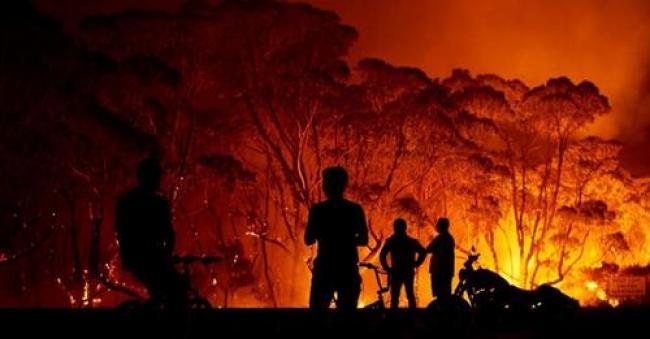Articles Menu

August 26, 2021
"It's a really big win," said Elaine Johnson, director of legal strategy at the Environmental Defenders Office (EDO), which represented Bushfire Survivors for Climate Action (BSCA). "It means [the New South Wales agency] has to do something to ensure there is protection against climate change."
"The next 10 years are really critical," Johnson told The Sydney Morning Herald, which noted that the ruling comes in the wake of a major United Nations climate report about what the future could hold without a global course correction. "We need rapid and deep emissions cuts."
Though the government of Australian Prime Minister Scott Morrison has long faced pressure to take bolder climate action and a federal court in the country found in May that Environment Minister Sussan Ley has a duty to protect children and the environment from the climate emergency, Johnson said Thursday's decision was the first in Australia to find that a government agency is required to address the global crisis.
"It's breaking new ground," she told the newspaper, adding that other Australian states could soon face similar legal challenges.
The landmark ruling in favor of survivors of the 2019-20 bushfires and earlier seasons came from Brian Preston, chief judge of the Land and Environment Court of New South Wales (NSW).
Preston ordered the NSW Environment Protection Authority (EPA) "to develop environmental quality objectives, guidelines, and policies to ensure environment protection from climate change" in the Australian state.
Though Preston found that the EPA has not fulfilled its legal duty to ensure such protection, he said the agency "has a discretion as to the specific content of the instruments it develops" and his order "does not demand that such instruments contain the level of specificity contended for by BSCA, such as regulating sources of greenhouse gas emissions in a way consistent with limiting global temperature rise to 1.5°C above pre-industrial levels."
The EPA had argued that it has already "developed numerous instruments to ensure environment protection in many ways, some of which incidentally regulate greenhouse gas emissions, such as methane from landfill," according to the Australian Broadcasting Corporation.
In a statement, the agency—which has 28 days to appeal—said it was reviewing the decision.
"The EPA is an active government partner on climate change policy, regulation, and innovation," the agency statement said. "It is a part of the whole-of-government approach to climate change embodied by the NSW Climate Change Policy Framework and Net Zero Plan."
The statement also highlighted the EPA's involvement in "work that assists with and also directly contributes to" adaptation and mitigation measures, its support for industry "to make better choices," and its recently released "Strategic Plan and Regulatory Strategy."
Despite the judge's decision to limit the specificity of his order for the agency to act, his ruling was still welcomed by survivors, their legal representation, and climate campaigners around the world.
"This is a significant win for everyone who has been affected by bushfires," said BSCA president Jo Dodds, explaining that survivors have worked to rebuild their lives, homes, and communities that were devastated in recent years.
"This ruling means they can do so with confidence that the EPA must now also work to reduce greenhouse gas emissions in the state," she continued. "Global warming is creating the conditions that can lead to hotter and fiercer fires, and all of us need to work to make sure we're doing everything we can to prevent a disaster like we saw during 2019 and 2020."
As Johnson put it: "The EPA has discretion as to what they do but they have to do something and it has to be meaningful."
"Greenhouse gases are the most dangerous form of pollution," she told The Guardian. "An obvious response to this order would be to control greenhouse gases in the same way they do other pollutants in the environment."
The nonprofit Nature Conservation Council said the court's decision "should send a chill through the state's most polluting industries, including the electricity and commercial transport sectors."
"Most people will be astonished to learn the EPA has until now not regulated greenhouse gases," said the council's chief executive, Chris Gambian. "But that will now have to change."
"This is a great day for environmental justice," he declared, crediting BSCA "for having the courage to launch this case" and EDO for their convincing arguments.
Calling human-caused climate change "the most significant challenge our society has ever faced," Gambian asserted that "allowing politicians to set greenhouse gas emission targets and controls rather than scientific experts has led us to the precipice."
"These decisions are far too important to left to the politicians. These are issues of science and should not be hijacked by the political process," he added. "We hope that today's decision results in the effective regulation of greenhouse gas emissions and gets the state on track to net zero well before 2050."
[Top photo: Residents look on as flames burn through bush on January 4, 2020 in Lake Tabourie, Australia. (Photo: Brett Hemmings/Getty Images)]